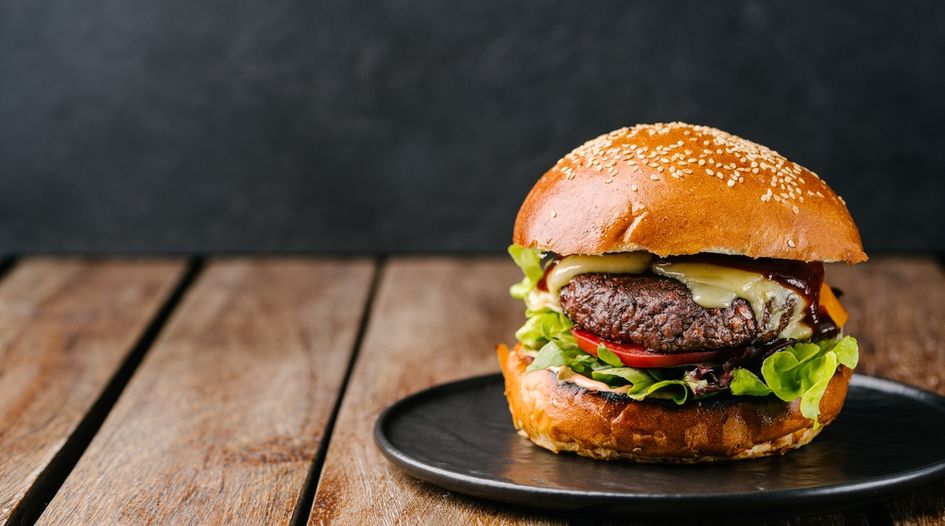Impossible Burger spat highlights issues of personal jurisdiction

The US Court of Appeals for the Ninth Circuit has reversed a district court’s dismissal of trademark declaratory judgment claims, finding that pre-enforcement commercialisation activities can in fact be used to establish personal jurisdiction (Impossible Foods Inc v Impossible X LLC, Case Number 21/16977, 12 September 2023, Lucero, Bress, VanDyke, J dissenting).
Case background
Impossible Foods is a Delaware corporation that manufactures plant-based meat substitutes, including the Impossible Burger. Impossible X, a Texas LLC, is Joel Runyon’s one-person company, selling apparel and nutritional supplements using a website and social media. San Diego, California, was Impossible X’s base for two years; a LinkedIn profile listed it as the headquarters and social media frequently tagged San Diego as Impossible X’s location. When vacating his lease, Runyon signed the document as ’Joel Runyon, Impossible X LLC’. Even after leaving, Runyon took at least eight trips to California between 2017 and 2019 for Impossible X work and to promote the brand.
In 2020, Impossible X filed a notice of opposition against Impossible Food’s trademark application at the TTAB. Impossible Foods responded a year later with a declaratory judgment action in California, seeking a finding of non-infringement and for its rights to the IMPOSSIBLE mark to be ruled superior. Impossible X filed for dismissal, arguing that the district court lacked personal jurisdiction over the case.
Criteria for jurisdiction
To establish specific personal jurisdiction over a non-resident defendant, the defendant must purposefully direct its activities towards the forum or benefit from the privileges of conducting activities there. Further, the claim must arise out of or relate to the defendant’s forum activities, and exercise of jurisdiction must be reasonable.
The district court acknowledged that the personal jurisdiction question here was a “close one”. While Impossible Foods satisfied the purposeful direction or availment requirement, the declaratory judgment action did not arise from or relate to Impossible X’s contact with California. Impossible Foods did not begin use of its mark in commerce until June 2016, at which point Runyon had already left California. Thus, the district court found that the parties had not had a live dispute until that time, so Impossible X’s prior contact with California was irrelevant to personal jurisdiction. Impossible Foods appealed.
The Ninth Circuit analysed each prong of the jurisdiction test and reversed the dismissal. First, it agreed with the district court that Impossible X had purposefully directed activities in California and benefitted from the legal privileges of establishing trademark rights there (a court typically treats trademark infringement as tort-like for personal jurisdiction purposes). The Ninth Circuit explained that there is no need to adhere to an “iron-clad doctrinal dichotomy” between purposeful availment and direction. It leaned on “purposefulness” with regard to the forum state and concluded that Impossible X purposefully directed its activities towards California and availed itself of the benefits and privileges of the state’s laws. The court declined to analyse Impossible Foods’ argument regarding whether trademark enforcement activities could serve as support for personal jurisdiction, and found that Impossible X’s commercialisation was sufficient to satisfy the purposeful direction prong.
On the second criteria, the Ninth Circuit ruled that Impossible Foods satisfied this requirement that a claim must arise out of or relate to the defendant’s forum activity. The court explained that Impossible X’s trademark-building activities formed the basis of the contested rights and, when applied to personal jurisdiction, the exclusion of pre-enforcement commercialisation activities was too rigid. The court noted that in filing an opposition at the board, Impossible X put its pre-2016 use of the IMPOSSIBLE mark at issue.
On the final criteria, reasonable exercise of jurisdiction, the Ninth Circuit concluded that requiring Impossible X to defend a lawsuit based on trademark-building activities in California was not unreasonable. Thus, the district court’s decision to dismiss the claim was reversed.
Contrary view
Judge VanDyke opposed this. He argued that Impossible Foods waived Impossible X’s brand-building rights, and that Impossible Foods’ arguments amounted to a “nothingburger”, noting that it relied on Impossible X’s enforcement activities only for the first two criteria. Not only had Impossible Foods argued that Impossible X satisfied the intentional act requirement, but the district court had also explained why Impossible X’s trademark-building contacts were sufficient to establish purposeful direction or availment, yet insufficient to meet the ‘arising out of or relating to’ requirement. The court explained that its ruling was far from an express disavowal of this basis for jurisdiction. Instead, it was a matter of prioritisation.
WTR recommends
Third Circuit deems candy shape and colour functional and unprotectable
Determining the ‘crax’ of the matter: an application of Section 10(17) in opposition proceedings
Alcohol labelling spat highlights jurisdictional limits
This is an Insight article, written by a selected partner as part of WTR's co-published content. Read more on Insight
Copyright © Law Business ResearchCompany Number: 03281866 VAT: GB 160 7529 10

